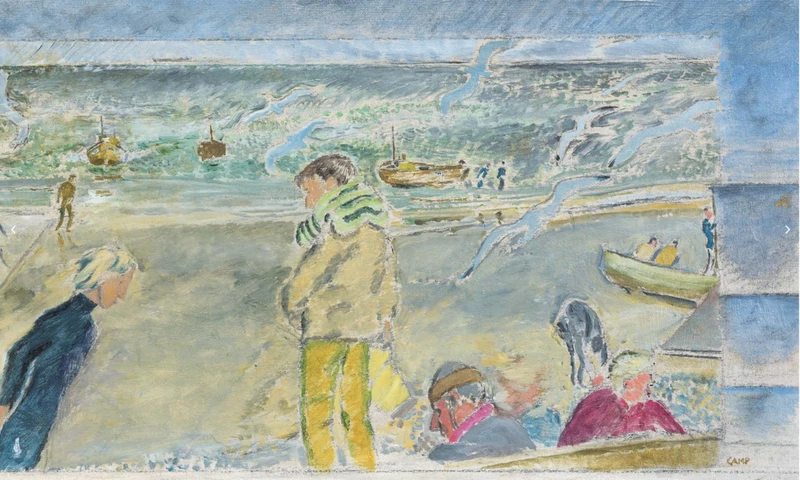CAMPANOLOGY: A Tribute to Jeffery Camp, 1923-2020
8 Apr-6 May 2022


…an artist who doesn’t miss a ripple or a tremor on the surface of contemporary events but who is at the same time in heroic independence of them. Andrew Forge
Jeffery Camp, who died in 2020 at the age of 96, was a painter whose canvases, far from letting themselves be confined to a time capsule, ceaselessly seemed to spawn new directions, new interpretations and new experiences. Over a long career he moved through a number of phases and with each successive development never failed to produce works of sublime individuality and invention and without ever losing sight of his central belief in what Helen Lessore, an early devotee, referred to as ‘The Great Tradition of European Art’.
To those who know and love Jeffery’s work it was one of his great strengths: a demonstration of bravery in reaching out for new and authentic ways to express his feelings for the world as he saw it; a world that he looked at with an unceasing optimism for the human condition. But it may also have been unnerving for many in the art establishment. It made him difficult to categorise: a maverick, an outsider. He didn’t fit. There were major exhibitions in public galleries and work is held in prestigious collections but he was too often absent from the survey exhibitions that launched and then buttressed the careers of others.
In 2007 at the age of 84 Jeffery’s ‘Rubicon’ exhibition filled Art Space Gallery with a series of large ambitious works that proved that he was still an artist of crucial importance. They drew comments from artists and curators alike: Frank Auerbach, John Craxton, William Feaver, Anthony Green, Timothy Hyman, Andrew Lambirth, John McEwen, John McLean, Richard Morphet, Norman Rosenthal all contributed to the catalogue and Barry Schwabsky described them as ‘Camp unbound: there is nothing else like this in painting today.’. They were unmistakably Camps but he had reinvented himself again and to this day the true significance of these paintings has never been properly appreciated.
Jeffery worked where he lived in a terraced house in Stockwell, London, that had grown around him. He emanated a relaxed assuredness in himself and his art that seemed to make him immune to the temptations of the art world. He was beyond shallow ambition and indifferent to the demands and desires of the world around him. He painted what he had to paint and throughout his life new visual experiments seemed suddenly to come into being that broke away from the norms and conventions; new image and material coming alive and proliferating but grounded in all that had gone before.
This exhibition pays tribute to his supreme originality with a selection that connects the work of the young man in his twenties painting the lowlands of Suffolk in the 50s to the artist in his nineties painting the semi-abstract urban landscapes of London. It invites a new generation of young artists who see Jeffery as a beacon of light to experience his oeuvre for the first time. His existing audience I know will feel at home but I hope they too will discover new elements and recognise the underlying continuity of spirit, vision and language that places him firmly in the pantheon of post-war British artists.
Jeffery Camp was born at Oulton Broad, near Lowestoft in Suffolk in 1923 and studied at Lowestoft Art School, Ipswich Art School and Edinburgh College of Art where he was taught by William Gillies (1941). In 1944 he returned to Suffolk and painted the East Anglian coast for the next 20 years. Between 1963 and 1988 he taught at the Slade School of Fine Art, London, and was elected a RA in 1974.
He has exhibited at Gallerie de Seine, Helen Lessore’s Beaux Arts Gallery, the New Art Centre, Nigel Greenwood, Browse and Darby and then with Art Space Gallery since 1998. Major retrospective exhibitions have been held at the South London Gallery (1973), the Serpentine Gallery (1978), the Royal Academy (1988) and a 90th birthday tribute at the Jerwood Gallery, Hastings (2013). His work is held in the collections of Tate, the British Council, Arts Council England, the Government Art Collection and numerous regional collections.
He also holds the distinction of having written the best-selling publications ‘Draw - How to Master the Art’ (1981), ‘Paint’ (1986) and ‘Almanac’ (2010).
CAMPANOLOGY: A Tribute to JEFFERY CAMP 1923-2020 | Press Release
Download